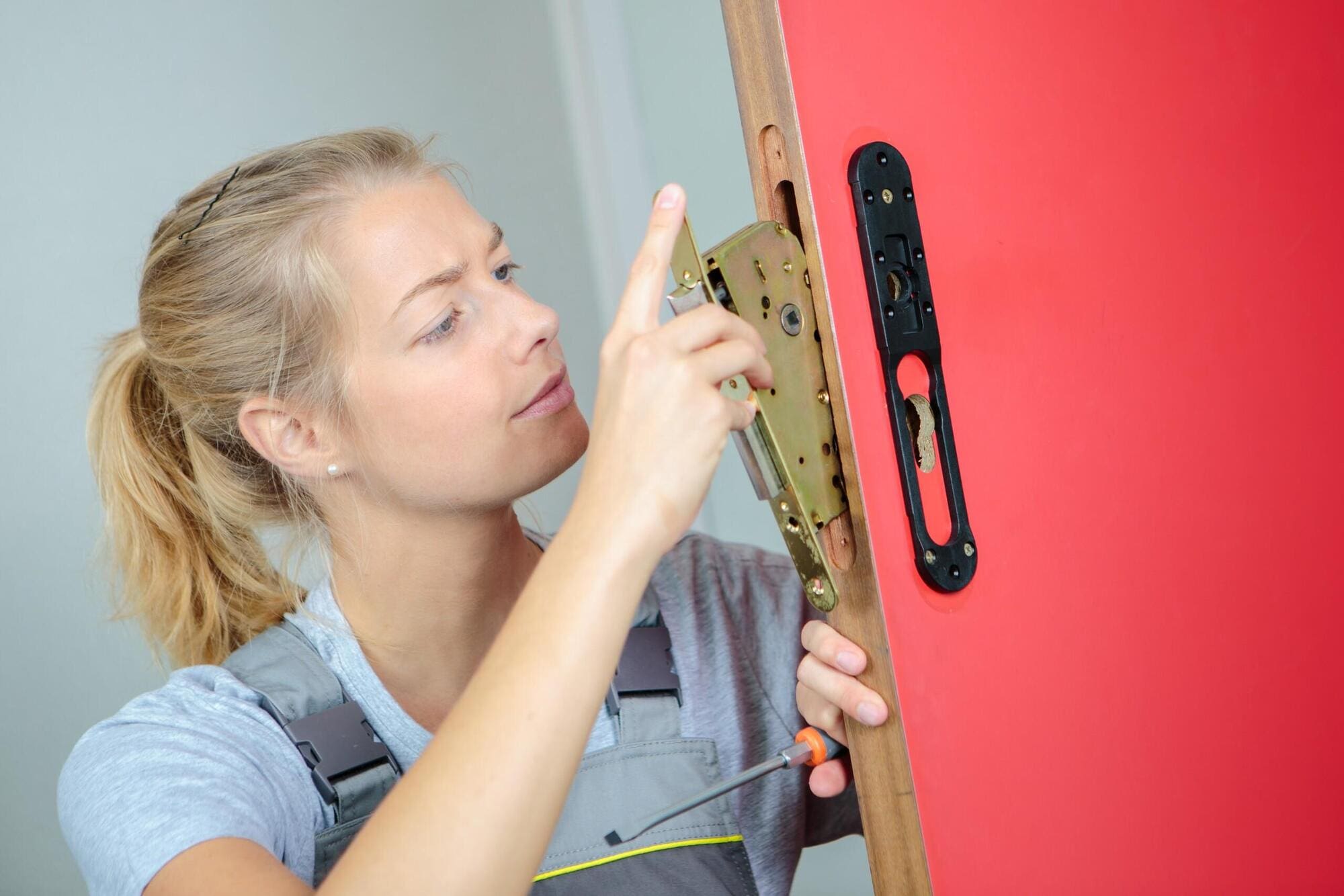In this Locksmith Career Guide
What Does a Locksmith Do?
Locksmiths do more than install, maintain and repair locks for businesses and homeowners. They also help people to regain entry into their properties or cars if their keys are broken or lost, as well as other activities.
There are different types of locksmiths, such as emergency, car (auto), commercial, residential, industrial, safe, master key, forensic, etc. Some may specialise in one or more areas or generalise. They may also combine the role with others, such as carpentry. Therefore, what a locksmith does will depend on their specialisms.
A locksmith’s main aim is to complete high-quality work and ensure it complies with legal and industry standards. If homes, businesses and cars cannot be properly locked and secured, it can leave them vulnerable to theft and other criminal activities. Overall, locksmiths have an essential role in keeping people safe, premises intact and companies in business.
Locksmiths will carry out many tasks, including estimating and quoting for jobs, advising customers, repairing or removing damaged/faulty locks, installing new locks, cutting keys, selling, installing, maintaining and servicing equipment and systems, picking locks, using various hand tools and equipment, etc. The role may also involve paperwork completion, computer work and cash handling.
Locksmiths can work and liaise with many people. There will be a lot of contact with customers/clients (business or private) on the phone and face to face. If employed, they will work with various colleagues, such as managers, other locksmiths, maintenance staff and support staff. They may also need to liaise with external stakeholders, including manufacturers, suppliers, retailers, contractors, tradespeople, trade associations, security companies, emergency services, etc.
Locksmiths are usually self-employed and will travel to homes, businesses and other locations locally, regionally or nationally. Some companies may offer full-time or part-time employed opportunities. They may also find freelance work, be part of a franchise or work with recruitment agencies on a temporary or contract basis.

Responsibilities
A locksmith’s responsibilities will depend on whether they are employed or self-employed and their specialisms.
Some examples of common duties can include (this list is not exhaustive):
- Selling and installing security equipment and systems, e.g. locks, CCTV, safes and others.
- Assessing jobs and carrying out security surveys.
- Identifying different styles of locks.
- Making estimates, i.e. time, materials and overall costs.
- Giving customers appropriate advice for their security situation and needs.
- Providing quotes to customers.
- Repairing, removing and replacing old, faulty or damaged locks.
- Rekeying locks, e.g. replacing lock pins and changing tumbler configurations.
- Picking locks where customers have locked themselves out of their property or car.
- Supplying and fitting new door and window locks.
- Maintaining and servicing locks, equipment and systems.
- Cutting keys for different types of locks by hand and machine.
- Using and maintaining various hand tools and equipment, e.g. grinders, drills and lathes.
Working Hours
A locksmith can expect to work 40–45 hours a week. However, they can do more or fewer hours depending on their role. Those self-employed will usually set their own hours and have more flexibility.
Being a locksmith is not a 9–5 job, and they often have to work unsociable hours, especially if it is an emergency call-out. There may be occasions to work early mornings, evenings, nights, weekends and bank holidays.
Locksmiths have to travel as part of their role, which may involve visiting different sites locally, regionally or nationally. There may also be some overseas work opportunities for some locksmiths.

What to Expect
There are many positives to being a locksmith, especially if an individual is practical and enjoys working with their hands. The role would suit someone passionate about customer service and helping people and businesses.
Being a locksmith is rewarding. When people get locked out of a premises/car or are victims of theft, it can be an extremely stressful experience for them. Locksmiths quickly attending to assist can be reassuring for those in distress. They help keep people and businesses safe and secure, saving them a lot of money and hassle later. Locksmiths can go home at the end of the working day knowing they have made a positive difference to a customer’s day and perhaps even their life.
Locksmithing is a skilled trade, and experienced locksmiths are in demand. There is no shortage of roles for individuals with the right skills and experience. Jobs are available nationally and maybe internationally, and there are opportunities to be employed, self-employed or freelance. With more competence, locksmiths can earn decent salaries, especially when working for themselves.
Being a self-employed locksmith and having an opportunity to be your own boss can be attractive. It can give individuals the independence to take charge of their working day and overall career progression. The start-up costs can be relatively low too, but these will need to be considered when deciding whether to be self-employed.
Locksmiths are unlikely to get bored, as their work is very varied. They could be cutting keys one day and attending an emergency the next. Some locksmiths will travel in their local area and nationally, so they will get to see various places and meet many people.
Even though there are positives to being a locksmith, there are challenges and cons, e.g.:
- Health and safety risks – locksmiths will face many hazards. Some examples include metal dust and shavings, lead from some metals, wooden splinters, use of tools, equipment and machinery, manual handling, driving, other hazardous substances, slips, trips and falls, work at height, confined spaces, etc. Individuals must be aware of the risks and how to protect themselves and others.
- Physical demands – being a locksmith is physically demanding. They will be on their feet for most of the working day, and the role involves extensive travel and often work at unsociable hours (especially in an emergency). Some work requires good physical fitness and strength, and there may also be work at height or in enclosed spaces. There may also be intricate work that requires immense concentration, e.g. lock picking, which can be frustrating and cause fatigue. Some locksmiths may work outdoors in all weather and have to wear protective equipment, which can be hot and uncomfortable.
- Mental demands – being a locksmith is also mentally demanding. They will deal with customers who are sometimes stressed, upset and angry when locked out or have been theft victims, which can be challenging, and they will need to be reassuring. Emergencies and meeting tight deadlines can be stressful, especially if things do not go according to plan. There is a lot of pressure, and mistakes can be costly, especially if self-employed and reliant on good reviews and reputation for future work.
- Time to become competent – individuals may be able to train quickly as a locksmith. However, becoming fully competent can take many years. There are lots of different locks, techniques, equipment and systems to learn and keep up to date with.
- Low starting salaries – when starting as a locksmith, the earnings can be low compared to other careers. However, they can be competitive with experience, with some earning over £30,000 a year.
Every career choice has pros and cons, and individuals must know what to expect before deciding whether it is a suitable career. The role is physically and mentally demanding, and there are health and safety risks. It also takes many years to become fully competent. However, there are many positives too, and individuals who become locksmiths love working in security and helping people and businesses.
When considering whether to be a locksmith, individuals should look at the pros and cons. They should also ensure they have the right personal qualities to carry out the role and responsibilities required.
Personal Qualities Needed To Be A Locksmith
Some of the personal qualities a locksmith requires will include (this list is not exhaustive):
- Manual dexterity and enjoys working with their hands.
- Physically fit with stamina.
- Knowledge of public safety and security.
- Knowledge of current security equipment and systems.
- Knowledge of health and safety.
- Patient, persistent, determined, logical, practical, reassuring and empathetic.
- Electronic and mechanical skills.
- Communication skills, both written and verbal.
- Customer service skills.
- Analytical thinking skills.
- Technical skills.
- Problem-solving skills.
- Being thorough, accurate and having excellent attention to detail.
- The ability to work under pressure and remain calm in stressful situations.
- The ability to use, maintain and repair various hand tools, portable electrical equipment and machinery.
- The ability to work well with their hands.
- The ability to work well with others and alone using own initiative.
- The ability to work quickly and efficiently, prioritise different demands and meet tight deadlines.
- The ability to work unsociable hours and be on call in emergencies.
- The ability to be flexible and adapt to change.
- The ability to accept criticism.
- The ability to use IT and software packages.
Qualifications
There are many different routes to becoming a locksmith, and individuals do not require formal qualifications. They could enrol on a training course, start an apprenticeship or apply directly to companies. They could also do work experience to help them enter the role.
Training courses
Undertaking a training course with a private training provider can help individuals become a locksmith. There are a range of courses covering different levels, such as novice, beginners, intermediate and advanced. There are also subject-specific courses, e.g. auto locksmith and safe opening. Most of these courses are short, i.e. 1–7 days.
There are usually no specific entry requirements for short locksmith courses. However, the MLA does require a basic security check before individuals attend. The Master Locksmiths Association (MLA) and the UK Locksmiths Association have further information on locksmith courses and qualifications.
Some training providers offer a Level 3 Diploma for Commercial Locksmiths and Property Security and a Level 3 Diploma for Automotive Locksmiths and Vehicle Security. These courses can take 6–12 months to complete for blended learning and around ten days face to face. Individuals should check the entry requirements with each provider, as they are likely to differ.
Individuals are not guaranteed success with courses and qualifications. However, it will demonstrate to employers and companies that they are keen on the job and may give individuals a competitive edge.
It is important to note that a short training course does not make someone a competent locksmith. As mentioned, it takes years for individuals to build up knowledge, skills and experience. According to the MLA, it can take around 3–4 years to become a fully competent locksmith, even after taking a 5-day training course.
Apprenticeships
There was previously an apprenticeship route to help individuals become a locksmith. However, government funding ceased, and it is no longer available. According to the MLA, a new apprenticeship may be in development, so individuals should regularly check for updates.
Individuals may decide to do an apprenticeship in carpentry, e.g. carpentry and joinery intermediate or advanced apprenticeship. Some locksmithing roles are combined with carpentry. Therefore, it can be a good route. It will also give individuals relevant knowledge and practical experience.
Individuals will usually need the following:
- Intermediate apprenticeship – some GCSEs, usually including English and maths, or equivalent.
- Advanced apprenticeship – four or five GCSEs, grades 9 to 4 (A* to C), including English and maths, or equivalent.
Opportunities are found on Government’s Apprenticeships, Institute for Apprenticeships and Technical Education and Indeed.
Applying directly
Some organisations offer locksmith trainee or internship roles where they will train individuals on the job and may also pay for them to do locksmith qualifications. It can be a good route for those struggling to pay for courses, as they can sometimes be expensive. Individuals will still need a good education and demonstrate a passion for locksmithing and security. Some opportunities may require practical work experience and individuals to have their own tools, PPE and vehicle.

Work Experience
Relevant work experience (whether paid or voluntary) can help individuals become locksmiths. They could apply for paid assistant roles in locksmithing companies where they could also help and shadow locksmiths or take on smaller jobs after training to gain experience. It is also beneficial to have practical hands-on experience, such as maintenance, electronics, carpentry, glazing, etc.
There may be volunteer opportunities, e.g. with charities and community schemes, where individuals could gain experience in customer service, security, carpentry, maintenance and repair. There is information on volunteering and local opportunities on Do-IT, NCVO, Volunteering Matters and Indeed.
Any work experience relevant to working in security, locksmithing, maintenance or carpentry can be beneficial and help an individual work towards becoming a locksmith. Even community courses can help, e.g. introduction to carpentry. Any experience with tools (hand and power) and machinery can be beneficial.

Training Courses
Learning does not stop with experience or once someone becomes qualified. Attending relevant training courses and having additional certifications can help individuals enter the profession, enhance their employability and give them a competitive edge. Many colleges and accredited private training providers can provide relevant training courses.
In addition to locksmithing qualifications, some examples of courses that may be useful for locksmiths include (this list is not exhaustive):
- Level 2 health and safety.
- Lead awareness.
- Asbestos awareness.
- Hazardous substances (COSHH).
- Work at height.
- Confined spaces.
- Noise and vibration.
- Work equipment (PUWER).
- Work-related violence.
- Work-related stress.
- Personal protective equipment (PPE).
- Abrasive wheels.
- Manual handling.
- First aid.
- Customer service skills.
- Data protection and GDPR.
- COVID-19 awareness.
- Equality and diversity.
- Business management (if self-employed).
- Time management skills.
Professional bodies, guilds and associations, such as the Master Locksmiths Association (MLA), the National Guild of Certified Locksmiths (NGCL), the UK Locksmiths Association, the Auto Locksmiths Association and others, can also advise on reputable training courses. Some also provide memberships, events and support to help individuals become locksmiths and give those already in the profession the means to continue their professional development. There is also a locksmith exhibition (MLA Expo) that is free to attend.
The type of training required will depend on the organisation an individual works for (or if they want to be self-employed) and the locksmithing activities completed. It is worth looking at several job advertisements to identify the training needed for roles. Jobs can be found on websites such as GOV.UK find a job service, Indeed, LinkedIn, Glassdoor, Timpson Locksmith and other job sites. Also, look at recruitment agencies and franchise opportunities for locksmithing roles.
More relevant training and competence (skills, experience and knowledge) will open up more opportunities. Refresher training is also advisable as it is a legal requirement and keeps an individual’s knowledge and skills up to date. Some associations require members to do CPD to continue with their membership.
Being self-employed
There are additional responsibilities associated with being self-employed.
Locksmiths must:
- Have the correct insurance, i.e. public liability and car/van and business. If employing anyone, employer’s liability insurance will be required.
- Register with HMRC.
- File tax returns.
- Register with the ICO to hold personal data, e.g. customers (to comply with the Data Protection Act 2018 and the GDPR).
Further advice and guidance on being self-employed can be found on GOV.UK.
If an individual decides to be a self-employed locksmith, they will need to factor in certain costs, such as:
- Training.
- Good-quality tools, equipment and machinery.
- PPE.
- Stock, e.g. locks.
- Running a vehicle, including fuel.
- Marketing and advertising.
- Insurances.
They should also research and decide on the area, market, competition and services to offer customers.
Becoming a member of a locksmithing association can also help self-employed locksmiths gain more business.
Criminal records checks
Locksmiths will be required to undergo a criminal record check, as they will be entering homes and vehicles. A criminal record, caution, warning, or conviction may put off prospective employers. It can even affect association membership. However, an employer should account for the seriousness of the crime, when it occurred and its relevance.
The organisation that holds criminal records will depend on the country within the UK, for example:
- England and Wales – Disclosure and Barring Service (DBS).
- Northern Ireland – AccessNI.
- Scotland – Protecting Vulnerable Groups (PVG) scheme..
Driving
Locksmiths will need a full driving licence (preferably with no points), as they will travel to different jobs. Some employed roles may provide a company vehicle. However, if an individual is self-employed, they will need access to a suitable vehicle, e.g. a van, and have business insurance, etc.

Where Do Locksmiths Work?
Locksmiths can be employed by private companies/individuals, e.g. locksmithing and security companies, or work for recruitment agencies. Most tend to be self-employed and have their own business or freelance.
Locksmiths will travel often and predominately work in customers’ homes and businesses, e.g. residential, commercial and industrial establishments. They may also work outdoors in all weather, e.g. when working on vehicles.
Jobs are available nationally, and locksmiths can work in cities, towns or villages. There may also be opportunities to work overseas.

How Much Do Locksmiths Earn?
What a locksmith earns will depend on their working hours, services offered, specialisms, location, qualifications, experience and whether they are employed, self-employed or freelance.
According to the MLA, locksmiths can earn the following on average (these figures are a guide only):
- Trainee – £16,000.
- Experienced – £20,000–£25,000.
- Highly experienced – £30,000.
The salaries for self-employed locksmiths will be variable, as they will set their own fees. They will also need to consider expenses, e.g. tax, insurance, own tools, PPE and vehicle, etc.
As an apprentice, the salary will depend on an individual’s age and how long they have been in their apprenticeship. Apprentices must earn at least the current National Minimum Wage (NMW). Some employers will pay more than this. However, it will depend on the organisation and role on offer.

Types Of Locksmithing Roles To Specialise In
Individuals may generalise in all aspects of locksmithing, but there are opportunities to specialise in specific areas, such as (this list is not exhaustive):
- Residential locksmithing – locksmiths specialise in residential security and locks and carry out jobs for homeowners and landlords, e.g. fitting, removing or repairing locks to UPVC windows or doors and CCTV installation. This type of work is the most common. They can also help people get back into their homes if locked out.
- Commercial locksmithing – involves working for business customers on large buildings, such as offices, hotels and shops. Locksmiths will need more expertise, as security systems, locks and equipment can be more sophisticated and the technology more complex.
- Industrial locksmithing – these jobs involve attending large premises, such as warehouses, manufacturing facilities and other industrial sites. These locksmiths can do a range of specialist tasks, such as providing access control and installing security and master key systems.
- Auto (vehicle) locksmithing – locksmiths specialise in vehicle locks and keys and can work on different vehicles, such as cars, vans, bikes, lorries, etc. They can carry out complex work, such as key programming and copying, duplicating, repairing and replacing car keys.
- Emergency locksmithing – usually available 24 hours a day/7 days a week. They attend premises and/or vehicles in an emergency, e.g. locked out of the premises at night, lost keys or repairs after a burglary.
- Safe locksmithing – locksmiths receive specialist training to work with safes and vaults. They can supply, install, repair, move and open safes and vaults.
- Master key locksmithing – works in most commercial and industrial premises and sometimes residential premises. They specialise in master key systems, e.g. installing and maintaining multiuse access control systems.
- Forensic locksmithing – this area is very specialised and will require individuals to have more knowledge and expertise than other roles. They will help investigate crimes and insurance claims involving locks and security using various scientific methods, e.g. microscopy, metallurgy, disassembly and photography.
Individuals can also combine locksmithing with carpentry or window and door installation.
Various locksmithing roles will require differing knowledge, skills, experience and qualities. All locksmiths must have practical skills and be able to use and maintain tools and equipment. They must also have the necessary knowledge and a passion for customer service and helping people. Any additional areas of expertise will depend on what an organisation is looking for (if employed) and the type of role an individual wants. Further qualifications may be necessary for specialised work, e.g. safes, forensic and auto locksmithing.
Locksmiths not competently carrying out their roles can leave private/business customers vulnerable to burglaries and other criminal activity. This can cause financial losses and stress. It can also cause unnecessary damage to customers’ property/vehicles, which can ruin a locksmith’s (and company’s) reputation and negatively impact their business. Therefore, whatever the type of role, locksmiths must have the necessary competence to carry out the work professionally. They should also know the limits of their competency, i.e. asking for help when something is beyond their expertise.

Professional Bodies
Standards (e.g. lock standards), laws, products, equipment and technology are regularly changing. Therefore, locksmiths must keep abreast with the latest developments and changes to ensure they carry out their roles effectively, safely and correctly. Continuing professional development (CPD) gives locksmiths the knowledge and skills to keep up to date with these changes, understand their responsibilities, be legally compliant and progress in their careers.
Joining a professional body, guild or association (as mentioned previously) can help individuals enhance their skills and overall career. They offer different levels of membership, CPD, support, access to industry contacts and networking events. If self-employed, having a recognised membership can attract more customers.
There is an opportunity for career progression for locksmiths. With more qualifications and experience, they can specialise in different aspects of locksmithing, e.g. residential, commercial, auto, safe or forensic. They could become a supervisor, team leader or manager or train in other skilled trades, e.g. carpentry or glazing. Alternatively, they may work for a national locksmithing company, move from a small organisation to a large one, work for an agency or become a self-employed locksmith with their own business.
Knowledge, skills and experience from being a locksmith can also lead to a career in different areas. For example, they could go into teaching or training locksmithing at private training providers. They may decide to move into other areas and become a security guard or officer.

















